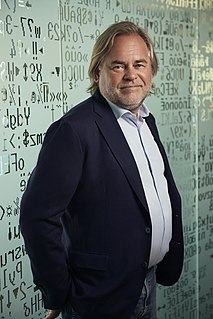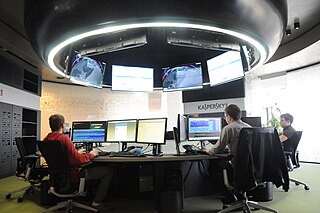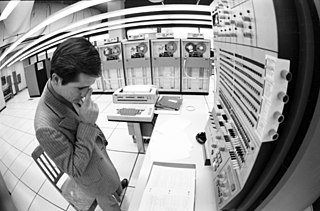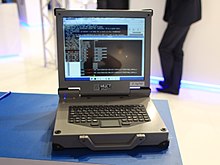
Silicon Graphics, Inc. was an American high-performance computing manufacturer, producing computer hardware and software. Founded in Mountain View, California in November 1981 by Jim Clark, its initial market was 3D graphics computer workstations, but its products, strategies and market positions developed significantly over time.

The Elbrus is a line of Soviet and Russian computer systems developed by the Lebedev Institute of Precision Mechanics and Computer Engineering. These computers are used in the space program, nuclear weapons research, and defense systems, as well as for theoretical and researching purposes, such as an experimental Refal and CLU translators.

Lenovo Group Limited, often shortened to Lenovo, is a Chinese multinational technology company specializing in designing, manufacturing, and marketing consumer electronics, personal computers, software, business solutions, and related services. Products manufactured by the company include desktop computers, laptops, tablet computers, smartphones, workstations, servers, supercomputers, electronic storage devices, IT management software, and smart televisions. Its best-known brands include IBM's ThinkPad business line of laptop computers, the IdeaPad, Yoga, and Legion consumer lines of laptop computers, and the IdeaCentre and ThinkCentre lines of desktop computers. As of 2021, Lenovo is the world's largest personal computer vendor by unit sales.

Boris Artashesovich Babayan is a Soviet and Russian computer scientist of Armenian descent, notable as the pioneering creator of supercomputers in the former Soviet Union and Russia.

Yevgeny Valentinovich Kaspersky is a Russian cybersecurity expert and the CEO of Kaspersky Lab, an IT security company with 4,000 employees. He co-founded Kaspersky Lab in 1997 and helped identify instances of government-sponsored cyberwarfare as the head of research. He has been an advocate for an international treaty prohibiting cyberwarfare.

Yandex LLC is a Russian multinational technology company providing Internet-related products and services, including an Internet search engine, information services, e-commerce, transportation, maps and navigation, mobile applications, and online advertising. It primarily serves audiences in Russia and the Commonwealth of Independent States, and has more than 30 offices worldwide.

Kaspersky Lab is a Russian multinational cybersecurity and anti-virus provider headquartered in Moscow, Russia, and operated by a holding company in the United Kingdom. It was founded in 1997 by Eugene Kaspersky, Natalya Kaspersky, and Alexey De-Monderik; Eugene Kaspersky is currently the CEO. Kaspersky Lab develops and sells antivirus, internet security, password management, endpoint security, and other cybersecurity products and services.
The Elbrus 2000, E2K is a Russian 512-bit wide VLIW microprocessor developed by Moscow Center of SPARC Technologies (MCST) and fabricated by TSMC.

Elbrus-2S+ is a multi-core microprocessor based on the Elbrus 2000 architecture developed by Moscow Center of SPARC Technologies (MCST). There are multiple reports regarding the evolution of this technology for the purpose of import substitution in Russia, which was raised by several ministries in July 2014, due to economic sanctions in response to 2014 pro-Russian unrest in Ukraine. In December 2014, it was announced that Mikron Group started pilot production of a dual-core variant of this microprocessor called Elbrus-2SM using a 90 nanometer CMOS manufacturing process in Zelenograd, Russia.

Yandex Browser is a freeware web browser developed by the Russian technology corporation Yandex that uses the Blink web browser engine and is based on the Chromium open source project. The browser checks webpage security with the Yandex security system and checks downloaded files with Kaspersky Anti-Virus. The browser also uses Opera Software's Turbo technology to speed web browsing on slow connections.

MCST is a Russian microprocessor company that was set up in 1992. Different types of processors made by MCST were used in personal computers, servers and computing systems. MCST develops microprocessors based on two different instruction set architecture (ISA): Elbrus and SPARC. MCST is a direct descendant of the Lebedev Institute of Precision Mechanics and Computer Engineering.
Monoblock PC is a computer workstation based on the Elbrus 2000 architecture. It was developed in Russia as a joint effort between Kraftway and the Moscow Center of SPARC Technologies (MCST).

The Elbrus-8S is a Russian 28 nanometer 8-core microprocessor developed by Moscow Center of SPARC Technologies (MCST). The first prototypes were produced by the end of 2014 and serial production started in 2016. The Elbrus-8S is to be used in servers and workstations. The processor's architecture allows support of up to 32 processors on a single server motherboard.
Regin is a sophisticated malware and hacking toolkit used by United States' National Security Agency (NSA) and its British counterpart, the Government Communications Headquarters (GCHQ). It was first publicly revealed by Kaspersky Lab, Symantec, and The Intercept in November 2014. The malware targets specific users of Microsoft Windows-based computers and has been linked to the US intelligence-gathering agency NSA and its British counterpart, the GCHQ. The Intercept provided samples of Regin for download, including malware discovered at a Belgian telecommunications provider, Belgacom. Kaspersky Lab says it first became aware of Regin in spring 2012, but some of the earliest samples date from 2003. Among computers infected worldwide by Regin, 28 percent were in Russia, 24 percent in Saudi Arabia, 9 percent each in Mexico and Ireland, and 5 percent in each of India, Afghanistan, Iran, Belgium, Austria, and Pakistan.

The History of computing in the Soviet Union began in late 1940s, when the country began to develop its first Small Electronic Calculating Machine (MESM) at the Kiev Institute of Electrotechnology in Feofaniya. Initial ideological opposition to cybernetics in the Soviet Union was outplayed by Khrushchev era policy that encouraged computers production.
Kaspersky Lab has faced controversy over allegations that it has engaged with the Russian Federal Security Service (FSB) to use its software to scan computers worldwide for material of interest—ties which the company has actively denied. The U.S. Department of Homeland Security banned Kaspersky products from all government departments on 13 September 2017, alleging that Kaspersky Lab had worked on secret projects with Russia's Federal Security Service (FSB). In October 2017, subsequent reports alleged that hackers working for the Russian government stole confidential data from the home computer of a National Security Agency (NSA) contractor in 2015 via Kaspersky antivirus software. Kaspersky denied the allegations, stating that the software had detected Equation Group malware samples which it uploaded to its servers for analysis in its normal course of operation.
Leonid Boguslavsky is a Russia-born Canadian entrepreneur, scientist and venture capital investor. He was named the Internet investor of the year and the most successful investor of the year. He is the founder of RTP Global, a venture capital firm with offices in New York, London, Bangalore and Singapore. He was one of the first investors in companies such as Datadog or Delivery Hero. Boguslavsky is in Forbes' billionaires list. His wealth is self-made from venture capital investments and he is widely considered one of the most successful technology investors.
Ruslan Stoyanov is a Russian computer scientist. In December 2016, he was arrested on charges of treason as part of the Mikhailov case. In 2019, he was sentenced to 14 years in prison.












